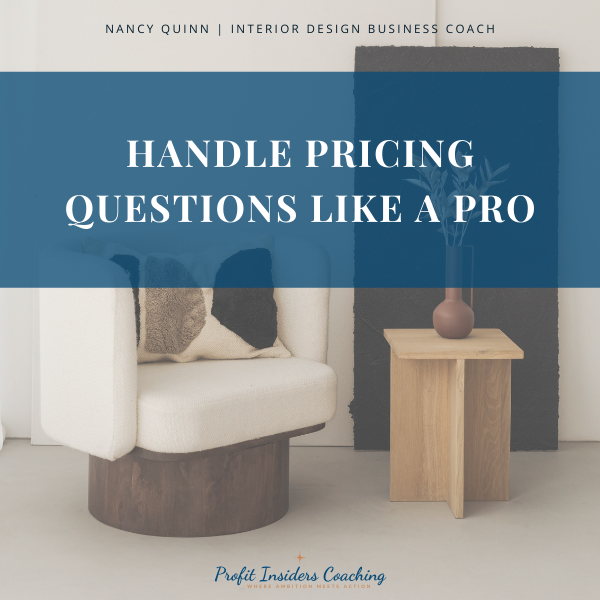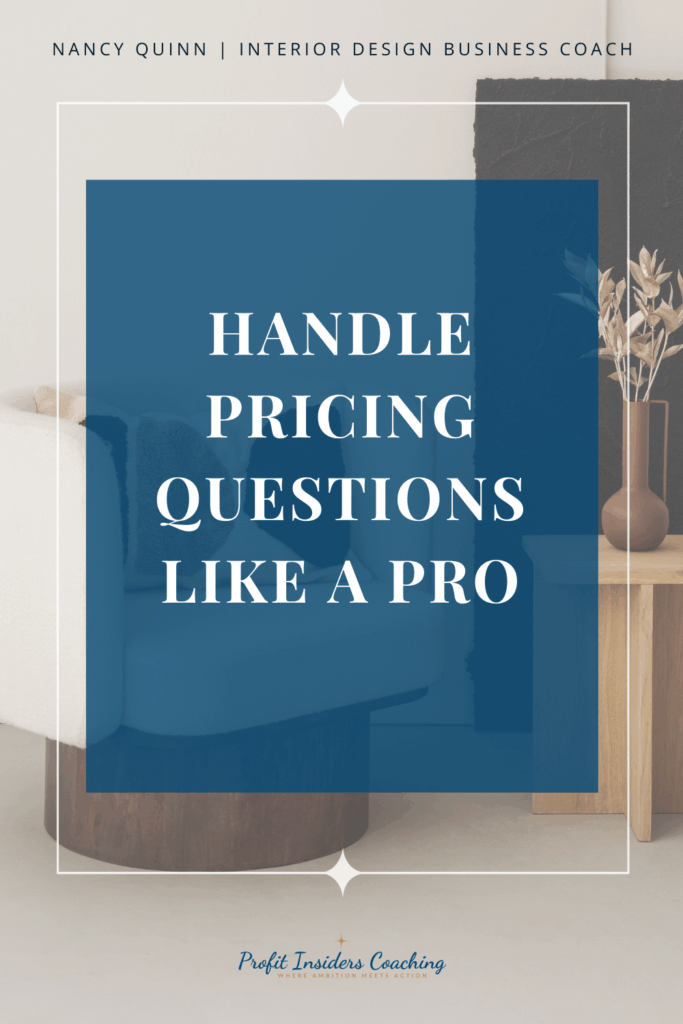
When a client asks, “Can we revisit this price,” it can make your stomach drop. Whether quoting for custom drapery, full-room design, or a consultation package, pricing objections can feel like a personal jab at your worth and expertise. If you can handle pricing questions like a pro, it can make all the difference.
As a business coach to interior designers, I hear about pricing anxiety every single week. I get that money conversations are tricky. But when you’ve got the right tools and language, you can use pricing questions to reinforce your value rather than discount it.
Let’s dive into how that looks.
Clients want to feel confident about how they’re spending their money. That’s not a bad thing! When they raise pricing concerns, it’s often because they’re unsure of the value behind the number—not necessarily because they’re trying to nickel-and-dime you.

Instead of feeling defensive, approach pricing questions as an opportunity to clarify the value you bring to the table. You are not just selling a product or service; you are selling your expertise, your ability to deliver a smooth process, and an outcome they can’t get without you.
Here’s a real-world example from one of my coaching clients. She presented an estimate for custom window treatments, and the client said the price seemed high and asked if she could “revisit it with the supplier.”
Sound familiar? Here’s how I advised her to respond:
Hi [Client’s Name],
I revisited the pricing with [Supplier], and this is the best pricing they can offer.
Custom drapery involves a lot of detail and craftsmanship, and I work with [Supplier] because they consistently deliver exceptional quality, timely installations, and reliable service.
By using trusted professionals, we avoid costly mistakes, delays, or rework, which actually saves money and time in the long run.
Let me know if you’d like to move forward. If we place the order by [Date], we can plan for installation around [Date].
Thank you. I look forward to hearing from you.
[Designer’s Name]
The outcome? The client moved forward with the order—no discounts, no stress—because the designer stood firm, explained the value, and gave clear next steps. That’s pro-level communication.
You’ll feel 10x more confident when you know your pricing is backed by a proven pricing system. It can help give you the confidence to price your services strategically and profitably. Plus, using this kind of resource takes the guesswork out of pricing, so you’re no longer scrambling when clients ask questions like:
When you know exactly how your pricing is structured and can explain the why behind it, clients respect your process. And you feel empowered, not anxious. Here are a few pro tips to keep in mind when clients question your pricing:
Talking about pricing doesn’t have to feel stressful or awkward. With the right mindset, clear communication, and a solid plan, you can handle pricing questions like a pro. Clients aren’t just paying for a service, they’re investing in you.
When you’ve got the tools to back up your pricing, you’ll feel more confident in your value and start seeing your profits grow too. If you’re tired of second-guessing your rates or fumbling through price objections, The KEY™ with GPT is your next step.
It helps you build custom pricing that reflects your value and guides you in responding like a pro every time a pricing question comes your way. You deserve to be paid well for your talent, so make sure you are.
When a client raises a pricing objection, stay calm and see it as an opportunity to reinforce your value. Emphasize your expertise, the quality of your vendors, and the seamless experience you provide. For a proven system to price with confidence, explore The KEY™ Pricing Tool.
Pricing objections are normal because clients want to feel confident about how they spend their money. They are usually questioning the perceived value, not trying to undermine you. Clear communication about your expertise and process helps build trust.
The best strategies include staying calm, explaining the craftsmanship and expertise behind your services, and showing how working with trusted suppliers avoids costly mistakes. Don’t rush to discount; instead, affirm your value confidently.
You build pricing confidence by having a solid pricing system in place, knowing your value, and practicing clear, professional responses to common objections. The KEY™ Pricing Tool can help you create a customized, confident pricing strategy.
Avoid immediately offering discounts or changing your pricing structure under pressure. Instead, explain what your pricing includes—such as project management, expert sourcing, and the prevention of costly errors—so clients understand the full value.
Pricing tools, like The KEY™ Pricing Tool, take the guesswork out of setting rates. They help interior designers confidently justify their pricing, making it easier to respond to client questions without fear or hesitation.
Offering quick discounts can set a bad precedent, signaling that your pricing is flexible or negotiable. This can lead to less respect for your services and smaller profits over time. Stand firm and reinforce the value you bring instead.
Focus on what the client gains: your expertise, access to high-quality vendors, project management that prevents costly mistakes, and a smooth, stress-free process. Clear communication shifts the conversation from price to value.
Adopt a mindset of confidence and education. Understand that client questions are not personal attacks but opportunities to reaffirm your value and guide them through the investment they’re making in their home and lifestyle.
Interior designers looking for a proven system to set profitable, confidence-building rates should check out The KEY™ Pricing Tool. It provides a step-by-step guide to building customized, strategic pricing.